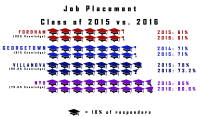
Fordham students and companies see interning as an integral part of professoinal training, but many face obstacles. Christian Wiloejo/The Ram
By Laura Sanicola & Eddie Mikus
While college students across the country vie for competitive internships to further their academic and professional careers, the process creates a wide array of challenges for a specific sect of the Fordham population.
Yota Oue, FCRH ‘17, and a native the Federated States of Micronesia, sees firsthand how not being a native citizen of the United States affects the internship process. “The challenge I’ve learned from [my friends] was that it is harder for them to obtain the internships because they have to have a green card or some work visa,” Oue said.
International students, who comprise seven percent of the Class of 2018, face restrictions on the kind of work that they can obtain in the United States based on limitations of certain types of visas.
The University World News estimates that “900,000 foreign students are expected to enroll in American higher education institutions this year with the big North American nation experiencing an astonishing 40+ percent increase in international student enrollments over the past decade.”
Fordham’s Office of International Services recognizes nine different kinds of visas for which international students may apply that are specific to the individual’s reason for staying in the country.
As a result of the Compact of Free Association (CFA) between the United States and the Federated States of Micronesia, Oue is able to both enter and work in the United States without a visa. However, knowledge of the benefits of the CFA is so minimal that Oue barely made it through customs.
“When I first came to New York, [customs] stopped me and didn’t believe that I was a Micronesian citizen and with this ability to enter the U.S. without the visa,” Oue said. “I was stopped for a while and had to bring up the compact online.”
Due to a misunderstanding by customs agents, Oue also is not in possession of an I-94 form, which is used to document the entry and departure of non-immigrants into the United States.
“I am supposed to have an I-94, one was not issued to me last year when I came to Fordham,” Oue said.
With no student visa, no I-94 form and no social security number, Oue must compete for internships against U.S. citizens within a complex system of employment that has varied rules on hiring immigrants and non-immigrants.
“Companies also don’t really help international students acquire a green card because the company themselves have to go through the paperwork based on the international interns that they want,” Oue said.
When a company considers entering the process of securing an internship position for an international student with varied forms of paperwork and visas, it takes into consideration whether or not an American student can fill the position.
“[To obtain] a full time job an international student will need to be sponsored by the company, if it really, really wants you, and sponsorship costs a couple of thousand dollars,” said Christian Zilio, GSB ’15, a Venezuelan native.
He added, “Even if you get the sponsorship, the government might or might not give you the visa.”
According to website of the Department of Homeland Security, it is within the restrictions of the F-1 visa, which is the most common visa for international students to obtain, that students may only work on-campus so long as the employment does not take a job away from a U.S. resident.
“Each student is very different, so each student should be looked at on an individual basis,” Erin McLaughlin, assistant director of experiential education in the Office of Career Services, said concerning how paperwork issues could impact the ability of international students to obtain internships.
“The student really needs to take ownership of what visa they’re here on,” she added.
The varied nature of these visas and the specific requirements of each company suggest that is easier said than done. If a student with an F-1 visa wishes to accept paid, off-campus employment considered an “integral part of the curriculum for a degree” by the Department of Homeland Security, a student must be eligible for Curricular Practicum Training (CPT).
The United States Citizen and Immigration Service (USCIS) defines CPT as “alternative work/study, internship, cooperative education, or any other type of required internship or practicum that is offered by sponsoring employers through cooperative agreements with the school.”
In order to obtain this, a student must already have been enrolled in a U.S. school for one year and must have already received a job offer in one’s major or field of study that qualifies before submitting CPT authorization request.
During or after the completion of a degree, international students also have the ability to receive Optional Practical Training (OPT). OPT requires that a student pursue employment in an area of study, but does not entail a specific employment opportunity at the time of application.
An F-1 student can apply for OPT after nine months at a U.S. college but cannot begin employment until receiving an Employment Authorization Document (EAD) from USCIS after a year of enrollment. On top of this, USCIS can take up to 90 days to process a request for OPT.
McLaughlin recommends international students resolve any potential visa issues with the Office of International Services, which must authorize both OCT and CPT.
In the face of the obstacles international students must overcome to secure internships in the U.S., Oue suggested that companies change their policies toward international students.
“Definitely, one [solution] is having those companies set up making sure that they do have positions available, maybe solely, for international students,” Oue said.
“It will just remove all the frustration and all the efforts of going through the process of internship. Finding out [your eligibility is limited] because you’re an international student and you don’t have a green card, it just stumps all your efforts.”
__________
Laura Sanicola is the Assistant News Editor and Eddie Mikus is a Staff Writer for The Fordham Ram.




Leave a Reply